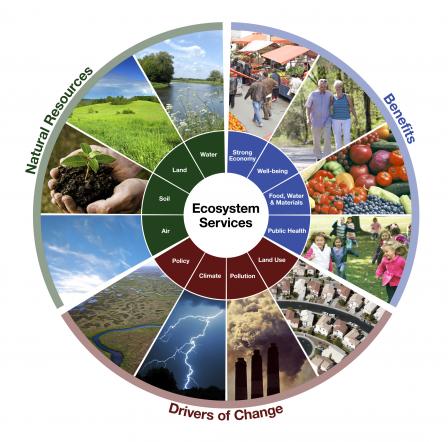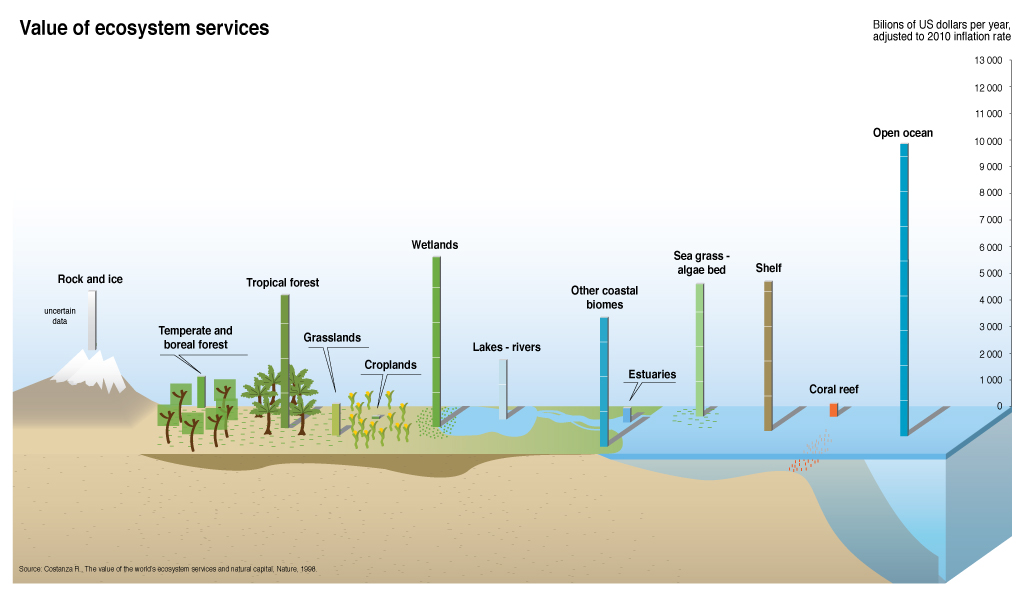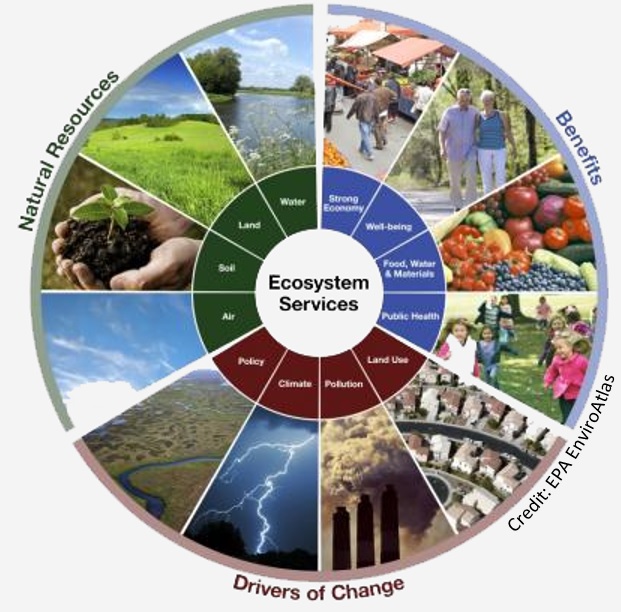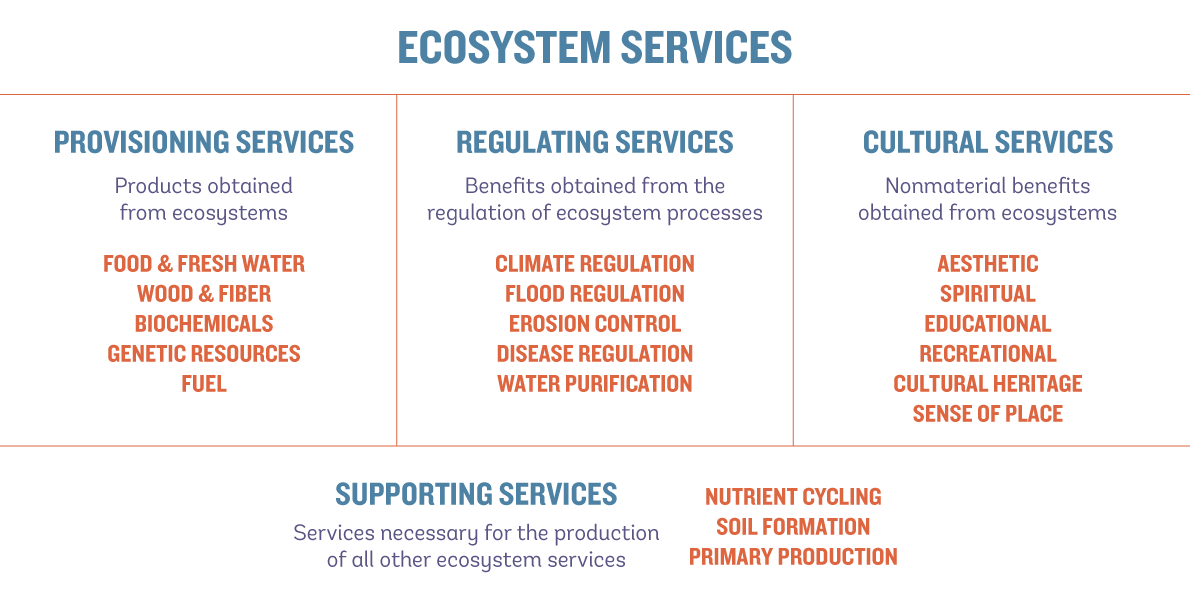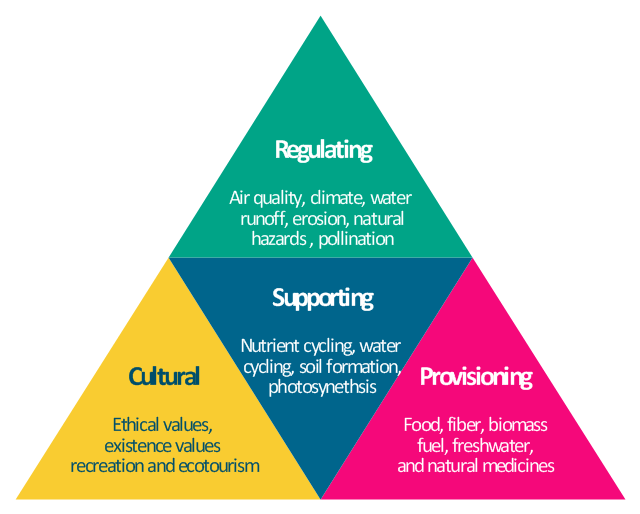Topic list of ecosystem services: Discover the indispensable "List of Ecosystem Services" that sustains life on Earth, offering a blueprint for harmonious human-nature relationships.
Table of Content
- What are the various types of ecosystem services categorized by the Millennium Ecosystem Assessment?
- Understanding Ecosystem Services
- Provisioning Services: Food, Water, and Resources
- Regulating Services: Climate and Disease Control
- Cultural Services: Recreation and Spiritual Benefits
- Supporting Services: Nutrient Cycling and Soil Formation
- Conservation and Sustainable Use of Ecosystems
- YOUTUBE: Understanding Ecosystem Services
- The Role of Biodiversity in Ecosystem Services
- Economic Valuation of Ecosystem Services
- Challenges in Ecosystem Services Management
- Future Directions in Ecosystem Services Research
What are the various types of ecosystem services categorized by the Millennium Ecosystem Assessment?
The Millennium Ecosystem Assessment categorized ecosystem services into four main types:
- Supporting Services: These services are necessary for the production of all other ecosystem services. Examples include soil formation, nutrient cycling, and primary production.
- Provisioning Services: These are the products obtained from ecosystems, such as food, fiber, fresh water, and genetic resources.
- Regulating Services: These services control important conditions and processes in ecosystems, such as climate regulation, water purification, and pest regulation.
- Cultural Services: These are non-material benefits that people obtain from ecosystems, including spiritual and religious values, recreation, cultural heritage, and aesthetic values.
READ MORE:
Understanding Ecosystem Services
Ecosystem services are the vast array of benefits that ecosystems provide to humanity, essential for our survival and well-being. These services are broadly categorized into four main types: provisioning, regulating, cultural, and supporting services.
- Provisioning Services: These include the supply of food, water, timber, and other materials.
- Regulating Services: Natural processes regulated by ecosystems such as climate regulation, flood control, and disease regulation.
- Cultural Services: Non-material benefits obtained from ecosystems through spiritual enrichment, cognitive development, reflection, recreation, and aesthetic experiences.
- Supporting Services: These are necessary for the production of all other ecosystem services, including soil formation, photosynthesis, and nutrient cycling.
Understanding these services helps in recognizing the direct and indirect contributions of ecosystems to human well-being, emphasizing the importance of conserving and sustainably managing our natural environments.

Provisioning Services: Food, Water, and Resources
Provisioning services are fundamental ecosystem services that provide the raw materials for our survival. These include a wide range of tangible products that ecosystems produce, such as food, water, timber, fiber, and medicinal resources. Understanding these services illuminates the direct dependence of human societies on the health of our natural environments.
- Food: Ecosystems supply the variety of foods we consume, from fruits and vegetables to meat and fish, sustaining the dietary needs of humans worldwide.
- Water: Freshwater ecosystems are crucial for drinking water, irrigation, and sanitation. The natural filtration and renewal processes of these ecosystems ensure the availability of clean water.
- Timber and Fiber: Forests and other vegetative ecosystems provide timber for construction, fiber for clothing, and other materials for a myriad of uses.
- Medicinal Resources: Many plants and animals serve as sources of pharmaceuticals and herbal medicines, showcasing biodiversity"s potential to benefit human health.
These provisioning services are not only vital for survival but also underpin economic activities, highlighting the importance of sustainable management practices to preserve and enhance ecosystem productivity.
Regulating Services: Climate and Disease Control
Regulating services are critical ecosystem functions that maintain the balance and quality of the natural and human environments. These services include climate regulation, disease control, water purification, and pollination, among others. They play a vital role in mitigating environmental hazards and ensuring the stability and health of ecosystems upon which humans rely.
- Climate Regulation: Ecosystems regulate the Earth"s climate by controlling carbon dioxide and other greenhouse gases. Forests, oceans, and wetlands act as carbon sinks, reducing the impact of climate change.
- Disease Control: Healthy ecosystems can help control diseases by regulating the populations of disease vectors such as mosquitoes and ticks. This service is crucial for preventing the spread of diseases to humans and other species.
- Water Purification: Natural landscapes like forests, wetlands, and rivers filter pollutants from water, improving its quality for drinking, agriculture, and recreation.
- Pollination: Pollinators such as bees, birds, and bats are essential for the reproduction of many plants, including those important for food crops, supporting food security and biodiversity.
These regulating services are indispensable, providing natural solutions to many environmental challenges. Preserving and restoring ecosystems is crucial for enhancing these services and supporting global ecological balance and human well-being.
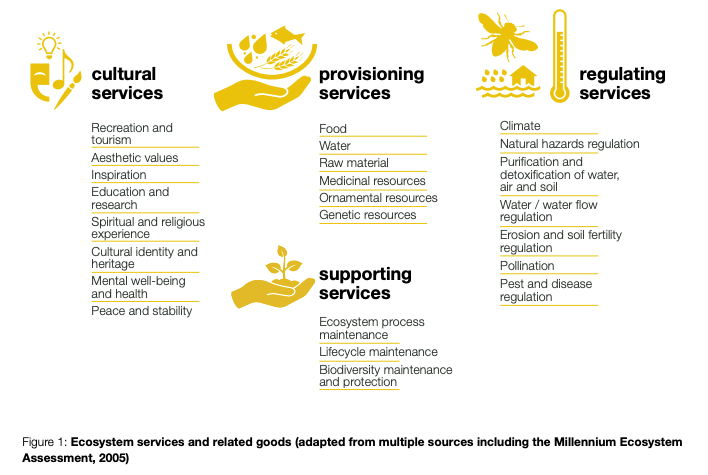
Cultural Services: Recreation and Spiritual Benefits
Cultural services provided by ecosystems are invaluable, enriching the human experience through recreational, aesthetic, and spiritual benefits. These services foster a deep connection between people and nature, enhancing mental and physical well-being, and contributing to the cultural and spiritual identity of communities.
- Recreational Activities: Natural areas offer spaces for leisure activities such as hiking, bird watching, and camping, promoting physical health and psychological well-being.
- Aesthetic Appreciation: The beauty of natural landscapes inspires art, folklore, national pride, and a sense of place, driving tourism and local economies.
- Spiritual and Religious Values: Many cultures find spiritual significance in natural features like rivers, mountains, and forests, which play central roles in religious practices and rituals.
- Educational Value: Nature serves as an open classroom, providing opportunities for environmental education and research, fostering curiosity, and encouraging conservation efforts.
Recognizing and preserving the cultural services of ecosystems is crucial for maintaining the cultural heritage and enhancing the quality of life for future generations.
Supporting Services: Nutrient Cycling and Soil Formation
Supporting services are fundamental ecosystem functions that underpin all other ecosystem services, enabling the Earth to sustain life. These include nutrient cycling and soil formation, critical processes that ensure the productivity and fertility of ecosystems.
- Nutrient Cycling: Ecosystems regulate the distribution and recycling of nutrients such as nitrogen, carbon, and phosphorus. This cycling is essential for plant growth and the health of terrestrial and aquatic environments.
- Soil Formation: The creation of soil through the weathering of rock and the decomposition of organic material is a slow but vital process. Healthy soils are crucial for agriculture, water filtration, and as a habitat for a myriad of organisms.
These supporting services are not always directly utilized by humans but are essential for the provision of all other ecosystem services. Protecting and enhancing these natural processes through conservation and sustainable management is critical for maintaining the resilience and productivity of ecosystems worldwide.

Conservation and Sustainable Use of Ecosystems
The conservation and sustainable use of ecosystems are crucial for maintaining the flow of ecosystem services that benefit humanity. This approach involves protecting natural habitats, restoring degraded areas, and using resources in a way that does not compromise the ability of future generations to meet their own needs.
- Protected Areas: Establishing and managing protected areas to conserve biodiversity and ecosystem services.
- Restoration Projects: Implementing restoration projects to rehabilitate degraded ecosystems and enhance their capacity to provide services.
- Sustainable Practices: Promoting sustainable agricultural, forestry, and fishing practices to reduce environmental impacts and maintain ecosystem health.
- Policy and Legislation: Developing and enforcing policies and legislation that support ecosystem conservation and sustainable use.
- Community Involvement: Engaging local communities in conservation efforts and sustainable use practices to ensure that ecosystem management is inclusive and equitable.
These strategies help in preserving the resilience and functionality of ecosystems, ensuring that they continue to provide essential services for human well-being and environmental health.
Understanding Ecosystem Services
Conservation: \"Embark on a journey to explore the beauty of nature and learn about the crucial importance of conservation efforts in preserving our planet\'s ecosystems. Discover inspiring stories of success and be part of the solution!\" Biodiversity: \"Dive into the fascinating world of biodiversity and witness the incredible variety of life forms that make our planet unique. Join us in celebrating the wonders of nature and understanding the importance of protecting biodiversity for future generations.\"
Ecosystem Services and Biodiversity - Science for Environment Policy
To keep Europe\'s ecosystems healthy, we need to protect #biodiversity. How can the ecosystem service approach help? And how ...
The Role of Biodiversity in Ecosystem Services
Biodiversity is the foundation of ecosystem services, offering resilience and stability to ecosystems while enabling them to perform various functions critical for human survival. The variety of life forms contributes to the complexity of ecosystem processes, enhancing the provision, regulation, and support of essential services.
- Enhanced Productivity: Diverse ecosystems are often more productive and provide a greater array of goods and services than less diverse ones.
- Resilience and Stability: Biodiversity contributes to the resilience of ecosystems, allowing them to recover from disturbances and maintain functionality.
- Pollination and Genetic Diversity: A rich diversity of pollinators increases crop yields and genetic diversity, crucial for food security and agricultural sustainability.
- Natural Pest Control: Biodiversity supports natural pest control mechanisms, reducing the need for chemical pesticides.
- Medicinal Resources: A diverse genetic pool provides raw materials for pharmaceuticals and medicinal compounds.
The conservation of biodiversity is therefore integral to sustaining ecosystem services. It ensures the continued provision of vital services such as clean water, air, and fertile soil, directly influencing human well-being and the health of our planet.
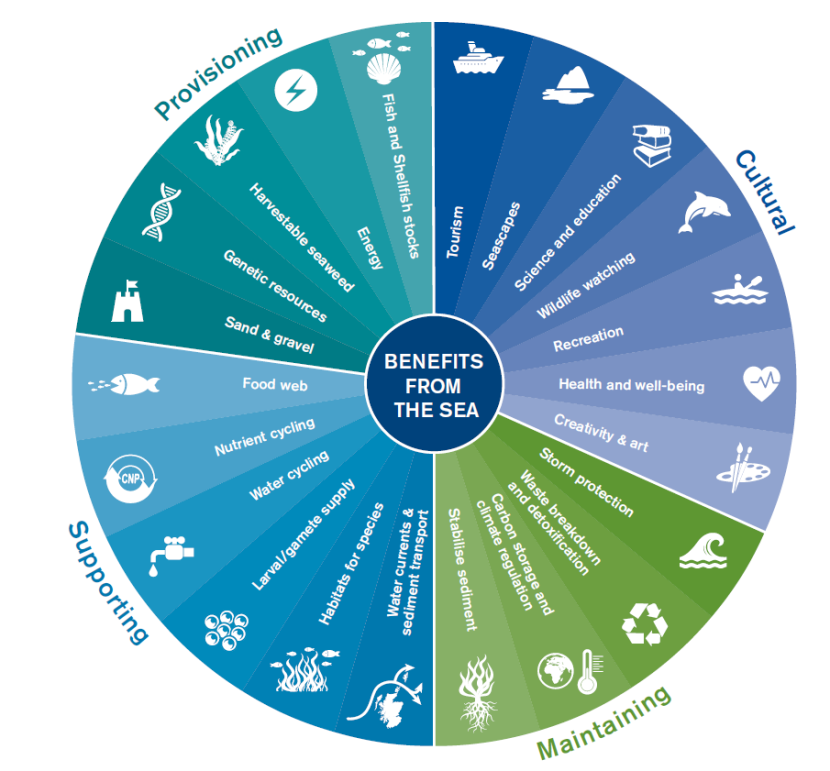
Economic Valuation of Ecosystem Services
The economic valuation of ecosystem services involves quantifying the benefits that ecosystems provide to humans in monetary terms. This approach helps in highlighting the immense value of nature to economies and societies, and supports better decision-making for conservation and sustainable use.
- Direct Use Values: The market value of resources directly consumed, such as timber, fish, and clean water.
- Indirect Use Values: The value of services that support the provision of direct use values, such as pollination for crops and flood protection by wetlands.
- Non-use Values: Values not associated with direct or indirect use, such as the intrinsic value of biodiversity and ecosystems for future generations.
- Option Values: The potential future use of ecosystems, reflecting the importance of preserving options for future generations.
Valuing ecosystem services in economic terms is challenging but crucial for understanding and communicating their importance. It aids in the integration of natural capital into policy and management decisions, ensuring the sustainability of these vital services for future generations.
Challenges in Ecosystem Services Management
Managing ecosystem services presents multiple challenges, primarily due to the complex interplay between ecological processes and human activities. Addressing these challenges is crucial for the sustainability of ecosystem functions and the continued provision of essential services to humanity.
- Anthropogenic Pressures: Urbanization, deforestation, and pollution significantly alter and degrade ecosystems, reducing their capacity to provide services.
- Climate Change: Global warming and extreme weather events disrupt ecosystem balance, affecting their ability to deliver services such as carbon sequestration and flood regulation.
- Overexploitation of Resources: Unsustainable agriculture, fishing, and resource extraction exceed the natural regeneration capacity of ecosystems, leading to resource depletion.
- Lack of Awareness: Insufficient understanding of the importance of ecosystem services among policymakers, businesses, and the public undermines conservation efforts.
- Economic Valuation: Difficulty in quantifying the economic value of ecosystem services complicates their integration into decision-making processes.
- Policy and Governance: Inadequate policies and fragmented governance structures impede effective ecosystem management and conservation strategies.
Overcoming these challenges requires integrated approaches that combine scientific research, policy-making, and community engagement to ensure the resilience and sustainability of ecosystem services for future generations.

READ MORE:
Future Directions in Ecosystem Services Research
Future research in ecosystem services is pivotal for advancing our understanding and management of ecosystems for sustainable human well-being. This research will likely focus on integrated approaches that address the complexities of ecosystems and their services to society.
- Interdisciplinary Research: Combining ecological, economic, social, and technological perspectives to understand the multifaceted nature of ecosystem services.
- Valuation Techniques: Developing and refining methods for the valuation of ecosystem services to better incorporate them into decision-making and policy.
- Climate Change Impacts: Assessing how global climate change is affecting ecosystem services and developing strategies to mitigate these impacts.
- Technological Advances: Leveraging technology, including remote sensing and big data analytics, to monitor and manage ecosystem services more effectively.
- Restoration Ecology: Enhancing research on ecosystem restoration and rehabilitation as critical components of ecosystem service management.
- Policy and Governance: Investigating effective governance models and policy instruments that promote the sustainable use and conservation of ecosystem services.
- Stakeholder Engagement: Understanding the role of stakeholder engagement in ecosystem service management, including community-based management practices.
These research directions aim to provide the knowledge and tools needed to preserve and enhance ecosystem services, ensuring their continued contribution to human and planetary health.
Embracing the vast array of ecosystem services is crucial for our future, guiding us towards sustainable living and preserving nature"s bounty for generations to come.
